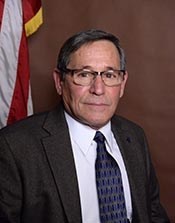 |
|
12/29/2021
|
OP-ED: Time to end National Grid’s harmful renewable energy policies
|
 By Rep. Edward T. Cardillo Jr. By Rep. Edward T. Cardillo Jr.
On Jan. 17, 2020, Governor Raimondo called for Rhode Island to become the first state in the nation to meet 100 percent of its electricity demand from renewables by 2030. It was a laudable goal then — and it remains so now — particularly in light of a recent United Nations report, which predicted a dire acceleration of global warming unless drastic measures are taken to reduce carbon emissions.
As policyholders, we have an obligation to ensure this worthy goal is met, not only from an environmental perspective, but from a job creation and economic development standpoint as well. We know with surety tension exists between renewable energy developers, National Grid, and the state’s utility regulators — the Public Utilities Commission (PUC) and the Division of Public Utilities and Carriers. We also know we rely almost entirely on electrical generation from beyond our borders, which makes us vulnerable. The power outages that impacted Aquidneck Island in 2019 underscore this point.
Renewable energy developers have repeatedly told us they are mired in a bureaucratic process at National Grid, where projects take years to be approved with ever-changing rules. There are also allegations of inflated interconnection costs from National Grid that are not substantiated. The entire process has lacked transparency, and there are legitimate concerns about whether or not National Grid has the authority to assess certain costs on developers. During the last session, I sponsored legislation to address these concerns. That bill overwhelmingly passed the Senate and the House this year. The legislation would have added transparency to this process and appointed an independent ombudsman to oversee the interconnection of renewable projects and mediate disputes. Unfortunately, the governor vetoed the bill at the urging of the PUC, citing impacts to ratepayers.
Disappointedly, neither National Grid nor the regulators participated in the hearings to address their concerns in an open format, where constructive dialogue could have occurred. Instead, they chose to skip the public hearing process and supply written testimony only after the hearing process concluded.
The main debate between developers and National Grid is whether or not National Grid has the authority to charge developers of small local projects for the cost of upgrading New England’s entire transmission system.
We were disappointed that the PUC did not conduct a rate-making hearing to assess the actual costs of these projects and include public testimony. We would expect the PUC to consider whether National Grid’s strategy is prudent and whether there is a more efficient and cost-effective strategy to achieve the state’s clean energy goals. Unfortunately, this level of analysis doesn’t seem to be occurring. Instead, the Commission offered unsubstantiated allegations of ratepayer impact. We do not blame the governor for vetoing the legislation, but we must act to ensure our renewable energy goals are being met. Therefore, I am hopeful the House and Senate will override the governor’s veto when we return in January.
Massachusetts recently began a process to evaluate more cost-effective options to manage the costs of interconnecting renewable projects that further the state’s energy policy objectives. This seems like a prudent path for Rhode Island.
Rhode Island’s largest renewable project to date, the Block Island Wind Farm, has had its operations severely impacted because of a faulty undersea cable, which is National Grid’s responsibility. Disturbingly, Grid overcharged ratepayers $46 million for that undersea cable without any apparent consequences from the PUC. We must determine whether Grid, a privately owned foreign company, is prioritizing the interests of Rhode Island ratepayers — or merely its shareholders.
It is also time to assess whether or not regulators are fulfilling their mission, whether renewable energy developers are paying their fair share of interconnection costs, and whether National Grid is unjustly burdening renewable energy developers to protect its own economic interests. These questions must be answered to confidently meet our clean energy goals.
To that end, I am calling for oversight hearings when the General Assembly reconvenes where we can hear from regulators, National Grid, and the developer community, along with renewable energy experts and stakeholders in a public and transparent setting, to answer these important questions.
Rep. Edward T. Cardillo Jr. is a Democrat from District 42 in Johnston and Cranston
For more information, contact:
Daniel Trafford, Publicist
State House Room 20
Providence, RI 02903
(401)222-1922
|
|